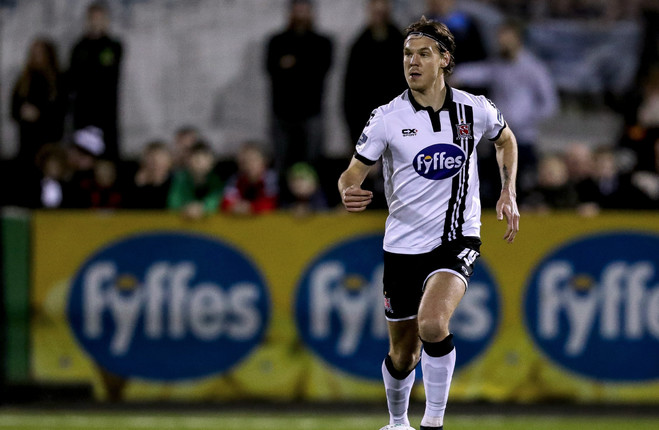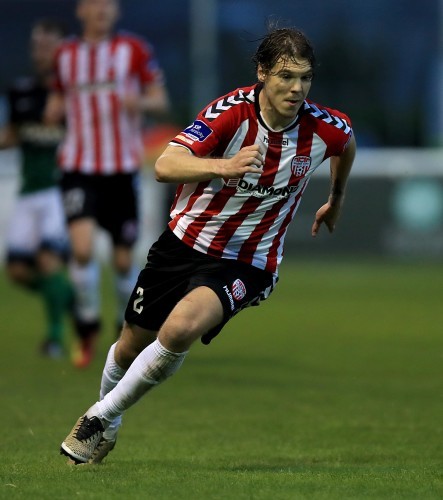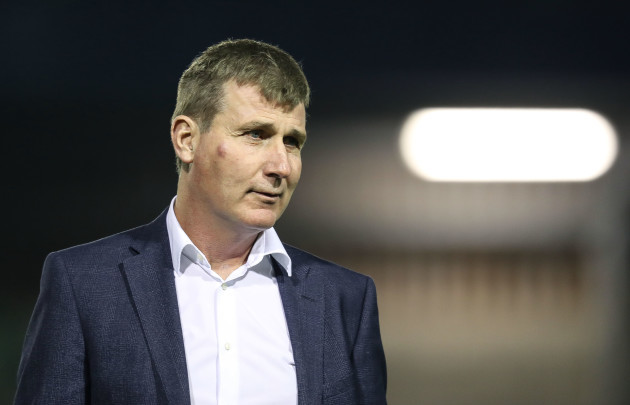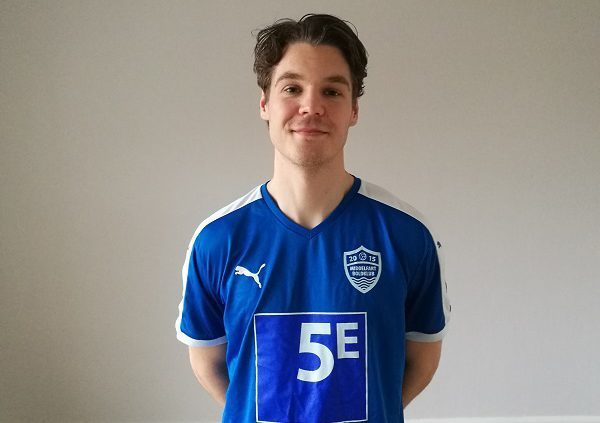LAST NOVEMBER, NICLAS Vemmelund was nine minutes away from putting his name in Irish football’s record books and consolidating his legacy as a Dundalk hero.
The Danish defender’s 94th-minute header had put the Lilywhites 1-0 ahead against Cork City in extra-time of the 2017 FAI Cup final.
Unlike his fellow countrymen later that month, however, the Dane would not leave the Aviva Stadium in a jubilant mood.
Achille Campion’s goal in the dying stages brought the sides level and John Caulfield’s men ultimately prevailed 5-3 on penalties.
It was a cruel end to the season for Stephen Kenny’s side, who previously lost the league title to Cork, despite a creditable second half of the season that saw them reduce what had been a sizeable gap at the top to just seven points by the end of the campaign.
Vemmelund had joined Dundalk in the off-season, hoping if not expecting to help the club win their fourth successive league title. Instead, he was leaving them one year on with just the League of Ireland Cup to his name.
And to the surprise of many observers, despite reported offers from Ireland, England, Scotland and the United States, Vemmelund is now plying his trade in the Danish third tier.
So what made the highly-rated defender make this decision?
Certainly, the less-than-ideal standards in the SSE Airtricity League Premier Division did not help matters, even if they were not the primary reason ultimately.
Vemmelund, who has previously had stints playing in Iceland and Sweden as well as his native country, believes more needs to be done to keep top players in the League of Ireland.
I think the facilities, the way they pay the players, they’re going to have to pay the whole year, not only 10 months or whatever the season is,” he tells The42. “I think they probably have to do a little bit more, every club has to go full-time and train in the mornings, train in the evenings, everything has to be better.
“If they don’t want to lose the best players, it’s not only [about] what you can earn, it’s the experience when it comes to training and you feel like it can be better with all the facilities they have, the coaching and the food, the preparing before the games and everything like that.
“It has to go all the way around and so do the supporters. They have to come out and show some support — it’s the best league in Ireland. They have to compete with the biggest league in England just over the sea, so they have to do more if they want to keep the best players in the league and go to every game to see them play instead of losing them every year — that’s my opinion about it.”
These critical quotes are not to suggest that Vemmelund thinks negatively of his time in Ireland though. After a short stint with Danish side IF Brommapojkarna proved fruitless, he joined Derry City on a free transfer in 2016, where the majority of those he encountered made the young defender feel at home.
“At the start, it’s tough, you have to get used to a lot of things,” he says. “You have to know the staff and the players and the way they play and stuff like that.
“But after a little while, when you get used to it, it’s not too bad. Always in the start and the end of the season, if you’re not going to stay, there’s so much technical stuff you have to sort out with your house, flat, apartment, whatever you have, and taxes, and everything — stupid things, to be honest, that you have to sort out.
Sometimes in the start and end of the season, that can be a little bit too much in your head when you have to focus on the football. But that’s kind of it, you play every day and you get a kind of habit in your day. You get used to it, and most Irish people are quite friendly and want to help, so it’s not too bad.”
Vemmelund took little time to make an impact in his new surroundings. Comfortable playing in the centre of defence or as a full-back, he swiftly established himself as a key player in Kenny Shiels’ side, helping the Candystripes finish third in his sole season there.
The player’s form was impressive enough to earn him a move to the then-reigning league champions and despite the higher expectations at Oriel Park, he did not disappoint. The former Denmark U19 international was particularly good in the Champions League second leg against Rosenborg, but still could not prevent his side’s Euro heartbreak, as they were beaten in extra-time by the Norwegian champions.
And despite a bitterly disappointing season overall for Dundalk on account of the incredibly high standards they had previously set, Vemmelund emerged from the experience with credit, earning a place in the 2017 PFAI Team of the Year on the back of some fine performances.
At the very least, Vemmelund clearly had the ability to enjoy a lengthy and successful career at the top end of the Premier Division, but instead chose to step down a level and join Middelfart Boldklub. The decision, he says, was primarily for personal rather than professional reasons.
“I missed home and had been away so long, so I wanted to come home and be close to my family and friends and my girlfriend as well,” he says.
“It was tough, but I made my mind up a couple of months before, so it was quite clear in the head before I left.”
Stephen Kenny made every effort to persuade the 25-year-old to stay, but the player’s mind had long been made up.
“We had a few chats, but when I got the first offer, I told him straight away that I didn’t want to negotiate anything, I just wanted to say that ‘I’m out next year’. He tried a lot, but it didn’t really work.”
Moving to Middelfart was “almost” a straightforward decision, though there were tempting offers from elsewhere.
“It always depends on how good the offer is, how good the club is, but it would have to be really good for me to stay abroad.
“A good offer came in at the last minute, but I decided to stay home. So far, I’m quite happy about it, I think I made the right choice.”
By returning to Denmark, Vemmelund sacrificed the benefits of playing full-time football. Dreams of featuring at a high level, in the Premier League or another competition of a similar standard, prompted him to postpone his studies several years ago. But now that the dream of playing at the very top is looking increasingly unlikely, he has returned to the world of education and is back studying Construction and Architecture.
It may be viewed as the pragmatic and less romantic of the two options, but in its own way, Vemmelund’s decision to partially put his sporting dreams to one side and focus more extensively on life outside of football took great courage and foresight. After all, how often have we heard disconcerting tales of footballers, even ones that make it big, being left stranded and in some cases, significantly depressed due to the formidable challenges and lack of options they face after retirement? The outgoing Dundalk star, by contrast, was not prepared to simply go with the flow.
Where I live now is five minutes away [from the training facilities],” he explains. “So it’s [great for] convenience, and when I have the study on the side, it’s quite good that way, and the club have some ambitions to get promotion this year or next, so that was one of the reasons [for moving] as well.”
And while the standard of football may not be as high, his new life is no less demanding than it was during the respective stays at Derry and Dundalk.
“We train in the evenings here four times a week and have a game at the weekend, so it’s quite similar with the training times, but then I have to study from eight in the morning to three in the afternoon, so I have less [free] time now than I had at Dundalk.
“You don’t really think about [the differences] too much. When you just have to do something else in your life, you get used to it quite fast.
“So far, I’m quite happy with it. I still have the football that I love, but then I have something else to think about when I don’t have the football, which is quite nice actually.”
On the other hand, there were always going to be downsides to leaving Ireland.
“I miss all the lads in Dundalk, who were really great for me,” he says. “I miss the atmosphere around the club before the games and during the games. It’s no secret that there wouldn’t be so many spectators at my games now as [compared with] Dundalk. And of course, I’m going to miss the European games.”
For the most part though, Vemmelund is content in his new life. As someone who has clearly prioritised education, he is critical of a system that creates pushy fathers and burnt-out kids, and which causes many footballers to live in a bubble while thinking too infrequently about the real world. Quite simply put, he believes that playing the game is a joyless experience for too many youngsters, owing largely to various external pressures.
“Especially around the UK and Ireland, many young boys go 100% for the football and don’t really think about the future afterwards with education and work and stuff like that,” he says.
“I want to have a decent life afterwards, where I can earn some money and pay for a nice house and car or whatever. That’s one of the reasons [for leaving] as well — I don’t want to be 40 and not know what to do.
I want to have a decent job and I want to study and that’s always a tough [dilemma], because if you want to be a pro footballer, you have to be 100% all time from when you’re young.
“But you have to work extra hard, because you still have to have an education or have it suited in with the football as well.
“So I think it’s quite tough. You have to find some place where you can do both [football and education] I think, unless you have the opportunity to go to a big club when you’re 16 and of course, go 100% for it, but I never got that chance. I started small, had the chance to study on the side and then I went full-time. I’ve stayed away from the studies for about six years now when I was just full-time, so I think it’s hard for most players to really find out what to do.
“You can see the players in the best leagues usually find a TV show or whatever they can get in on [after retiring], but not everyone can do that.”
Consequently, as Vemmelund suggests, it requires a laser-like focus and near-obsession with the game from a young age to make it to the top in the first place, but the higher these youngsters aim, the harder they often fall.
Michael Calvin, author of the fantastic book on underage football ‘No Hunger in Paradise,’ points out that the game “is not Walt Disney,” and Vemmelund clearly agrees.
“When you’re a young kid and play in the schoolyard every day, you have to work at 100% and still have fun. If you don’t have fun in football, you can stop when you’re a teenager, and go out and drink every weekend instead.
You have to enjoy your football as well. All trainers and all coaches are going to say you have to work at 100% every day — in the field or outside the field. But you still have to think about having fun in whatever you’re doing.
“I think that’s the most important thing, you must have fun.
“Whenever you finish in secondary school, you can go 100% for it. If you’re not [succeeding] after two or three years, you can find something else to do afterwards and still play football like I’m doing now.
“In the first couple of years, you can go 100% for it, but you can see quite fast [that] ‘I can’t make it’ and you don’t play for a club that’s good enough.
“I know it’s a dream [to play football at the highest level], but not every dream can come true, so you must have another dream as well.”
The42 is on Instagram! Tap the button below on your phone to follow us!




